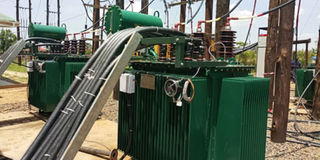What next for off grid operators when government extends electricity?

Power structures of Wenreco in west Nile. Off-grid operators generate and sell their energy directly to the customers especially those in rural areas. COURTESY PHOTO
In 2007, Electricity Regulatory Authority (ERA) enforced the Electricity (licence exemption) Isolated Grid Systems Order, regulations that were used to govern off-grid systems.
Due to the changing landscape of the electricity sector characterised by increasing players, increased generation capacity, among others, the regulator, with help from United States Agency for International Development (USAID) and Power Africa, is reviewing these regulations.
Off-grid Power Plants are not connected to the national grid essentially meaning they do not sell energy to government through Uganda Electricity Transmission Company Limited.
Off-grid operators generate and sell their energy directly to the customers especially those in rural areas.
However, through initiatives aimed at growing demand such as the electricity connections policy, implemented by Rural Electrification Agency, government is extending power to the rural areas, where most off-grid systems operate.
The total transmission network length otherwise known as national grid as at the end of 2018 was 2,569.8 Km.
What law says
The draft Electricity Isolated Grid Systems regulations 2019 underscores the future of off-grid systems in the wake of extension of the national grid to rural areas.
It is proposed that an off-grid operator be given six months written notice before the extension of the primary grid to the area where he operates.
If the grid is extended to an off-grid territory within the first five years of operation, the off-grid operator will be entitled to compensation for the remaining years within the five-year period.
An off-grid operator will also be given a choice of either terminating the business in exchange of sufficient compensation or relocate the assets to a different location.
The proposal also lists buying and selling power to the national grid, as viable options for the off-grid operator.
Mr Rik Wuts, co-founder and vice president business development, Powerhive, a private developer, said government should ensures that interconnection to the primary grid does not affect the investor’s revenue.
“You cannot be compelled to interconnect to the grid without a way that the investor is allowed to make the same return that he would have otherwise made if allowed to operate independently,” he said.
Advising government based on his experience in West Africa, where interconnection has been successfully implemented, he said the main utility often lets the off-grid operator serve and work with the people while providing additional power that the developer may need.
Developers also questioned the Authority’s need to break down the off-grid systems licence exemption threshold beyond the 2 Megawatt (MW) set in the 2007 regulations.
In their response, ERA said the purpose of breaking down off-grid systems lower than the 2MW threshold was to allow for the mushrooming lower capacity generators to join the market.
Licence exemption means the developer is not required to undertake detailed feasibility studies and quarterly reporting. In addition, a development below 0.5MW, is also not entitled to pay annual fees.
The regulation is expected to be rolled out before the end of this year.




